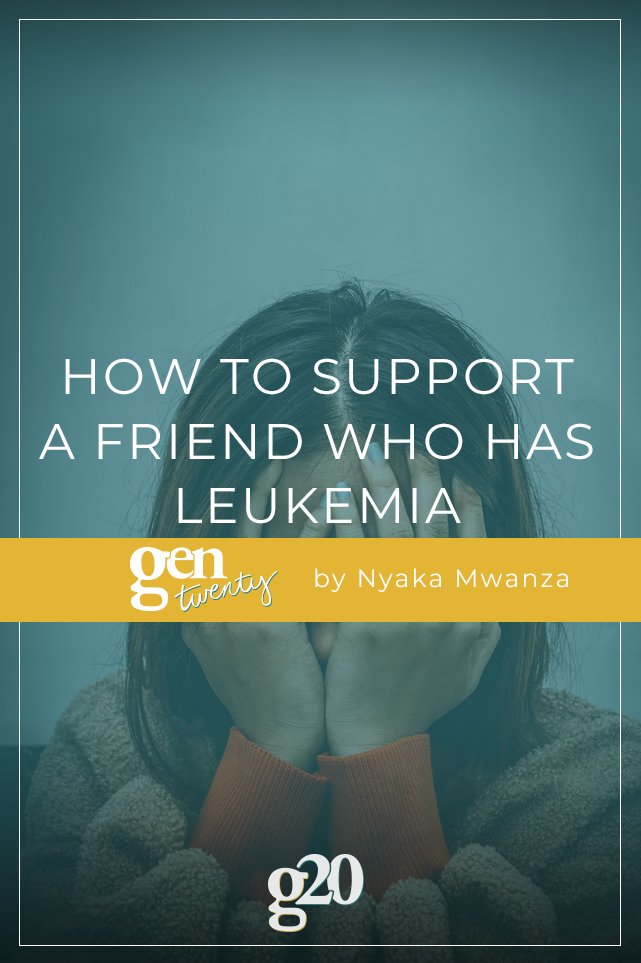No one in their 20s expects to get cancer, but approximately 4 percent of the estimated 61,000 people diagnosed with leukemia this year will be people in their 20s and 30s. If a friend gets the news that they’re one of the cases of leukemia diagnosed in young adulthood, they’ll likely need your support as they process their diagnosis and begin their journey through cancer care.
You may also experience an emotional rollercoaster of your own. What’s the right thing to do? What if I say the wrong thing? It’s hard to know what to say and how to support a friend who has leukemia. This is uncharted territory for both of you, and while you can find tips for what to say (and avoid saying) and do below, know that some of the most important things you can do are check in often, show up, and follow through.
Things to Say When Your Friend Has Leukemia
What you say or don’t say matters in helping your friend feel comforted, encouraged, understood, and supported. When choosing your words, remember to be sensitive to their experiences and emotions through this time.
Things You Should Say
Honesty and compassion are both important. Try to:
- Offer reassurance by reminding them of your support, such as “I’m here for you.”
- Be honest. It’s okay to say, “I don’t know what to say, but I care about you.”
- Show empathy and understanding through words such as “I’m sorry this is happening to you.”
As important as what you say is paying attention when your friend is talking to you, too. Most times, when someone is going through rough waters, they want to feel seen, heard, and understood. Your friend with leukemia will likely need you to lend a listening ear. More than anything else, be present, stay engaged, and listen actively.
Things You Shouldn’t Say
Try to put yourself in your friend’s shoes before speaking. Remember:
- Several topics can be sensitive or triggering, such as their long-term prognosis. Don’t ask, “How long do you have?” or “What is the acute myeloid leukemia survival rate?”
- “How are you?” might not be an appropriate question when your friend is in the thick of, say, an aggressive treatment cycle.
- Avoid comparison stories. Your friend probably doesn’t want to hear about your aunt’s cancer journey when they’re struggling to process their own.
- Don’t say “everything’s going to be fine.” Your friend may feel like they don’t have the space or permission to express their worries that everything might not be okay.
- Don’t center yourself—while you may be scared, frustrated, or tired, don’t make yourself the center of the conversation when your friend is sharing about their leukemia.

Things to Do For Your Friend Who Has Leukemia
From reading up on leukemia to preparing spare meals, there’s plenty you can do to step in and help out a friend who’s going through leukemia.
Do Your Homework
Your friend with leukemia will likely be overwhelmed with all of the new information coming at them right now. Learning what you can about your friend’s leukemia can serve both you and your friend in a valuable way. You remove the burden of your friend needing to educate you and answer your myriad questions, including some of the more difficult and sensitive questions. Having information about your friend’s condition may help you feel less helpless or out of control, too.
Support Your Friend’s Support System
A serious illness like leukemia affects more than just the person diagnosed. Blood cancer impacts a person’s family, loved ones, and close friends as well. A great way to support your friend with leukemia is to lighten the load for family and others who often shoulder the burden of being a caregiver. Try organizing a support team to share tasks, chores, and errands and to support one another.
Take Care of You
You can’t be a strong source of support if you’re burned out or overwhelmed. To maintain your capacity to lend support, you’ll need to ensure you take care of yourself. Consider seeing a therapist, counselor, or joining a peer support network of people supporting or caring for loved ones with leukemia. Talking to these people can help you process your own emotions in a healthy way.
Stick Around
A leukemia journey can be long, sometimes comprising multiple rounds of treatment and remission or relapse. Your friend will need your support throughout their leukemia journey. Remember these tips for the long haul:
- Be consistent and check in regularly to show your continued support.
- Give your friend space if and when they need it.
- Be flexible, and make plans that are easily changed or adaptable based on how your friend is feeling that day.
- Be patient and understanding when plans need to change or if your friend isn’t up for doing something you’d planned to do.
- As much as possible, treat them the same way you’ve always done.
People with leukemia tend to adjust to their diagnosis and the changes it brings better when they have a strong emotional support network. This includes the support of friends. With a strong network of support, people with cancer often have a more positive outlook and experience a better quality of life regardless of the specifics of their diagnosis, treatment, or disease course.
References
- Cancer Stat Facts: Leukemia
- How to Be a Friend to Someone with Cancer – American Cancer Society
- 10 Tips for Supporting a Friend with Cancer – Memorial Sloan Kettering Cancer Center
- Acute Myeloid Leukemia Survival Rate and Outlook – MyLeukemiaTeam
- How to help when cancer shows up – Cancer Hope Network
- Supporting a Friend Who Has Cancer – American Society of Clinical Oncology (ASCO)
